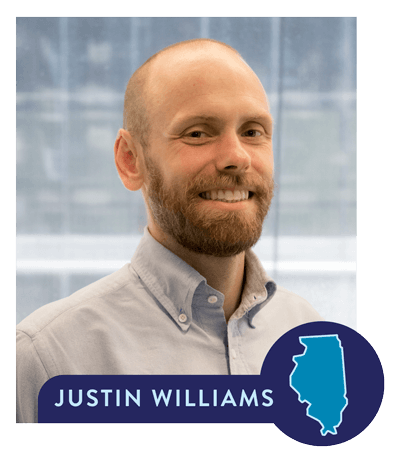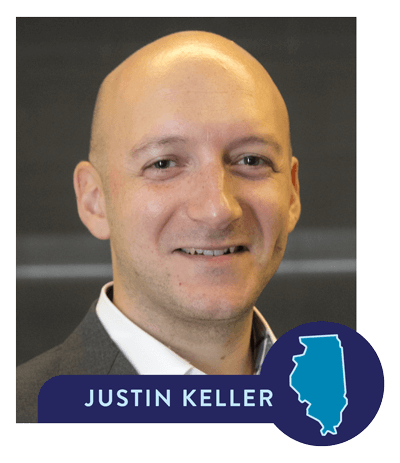Lessons from the Network: Justin Williams & Justin Keller
Justin Williams is Policy Manager, Effective Government and Justin Keller is Manager, Stormwater Management & Water Supply Management at Metropolitan Planning Council.
“For more than 85 years, the Metropolitan Planning Council (MPC) has partnered with communities, businesses, and governments to unleash the greatness of the Chicago region. We believe that every neighborhood has promise, every community should be heard, and every person can thrive. To tackle the toughest urban planning and development challenges, we create collaborations that change perceptions, conversations—and the status quo.”


This interview was conducted on 7/22/2021. It has been lightly edited for clarity and brevity.
River Network (RN): To get started, can you each give me a brief introduction to who you are, your role at Metropolitan Planning Council (MPC), and how you first got involved with drinking water issues?
Justin Keller (JK): I’m Justin Keller, I’m a manager on our water resources program. I work on both drinking water and storm water issues, and I first got involved in drinking water issues, while in grad school pursuing an urban planning degree. I focused originally on environmental planning and then ended up, accidentally, essentially, with a focus on water.
Justin Williams (JW): I’m Justin Williams and I am the Policy Manager at MPC and I work across the different programmatic areas that we have here at MPC, including water, transportation, housing, community development, and land use. I work across all of our programmatic areas to develop our policy agenda and to advocate for legislative change. I became involved in water issues through working at MPC and helping to advocate for the very fine policies that my colleagues here at the organization determine are going to have the greatest impact on the region.
RN: There are many facets related to clean drinking water, including issues of access, quality, affordability, and safety. Where do you focus your work?
JW: Our legislative work on water resources covers both the drinking water side and the stormwater, and to a lesser extent wastewater side. On the drinking water side, we work on issues of affordability and equitable infrastructure, so, in other words, how do you make sure every community in the state of Illinois has infrastructure that’s in good repair, delivering clean water to people? Through that work and equitable infrastructure, we work on toxics like lead service lines.
JK: And if I can add to that, you’re mentioning the legislative priorities, but we also partner directly with municipalities and water utilities to work on issues like lead service lines and water affordability and just general infrastructure maintenance. Part of our approach is an educational push to bring the knowledge of elected officials and staff, up to a level where they have at least an understanding of what they’re responsible for. So, I’m talking about the people that—the mayor—he or she is not involved in the day-to-day workings of the water utility but is very much involved in making sure that there’s safe, clean drinking water for the municipality, so we have an educational push as well as advocating for water affordability through research, with a goal of really being a partner to municipalities though. Not to shine a spotlight and say, “look at how bad you’re doing this,” but to help people understand what the main issues are and then provide education or technical assistance that help them address those.
RN: I know you all are a regional Chicago-based organization; besides the local and state level, do you also do any work regionally or federally/nationally?
JW: Only a little bit federally and primarily as it relates to issues that we’re working on at the state level. For instance, we work with our regional partners to advocate for funding for lead service line replacement, but that’s sort of the extent to which we do federal politics we pretty much stick to state of Illinois and the Chicago region.
RN: Access to clean drinking water intersects with public health, environmental justice, climate resiliency, and other issues tied to our health and well-being, like housing. How does your work fit into these broader systems?
JW: Really good question… I think we can bite that off from the context of lead service line replacement. I guess to me there’s sort of two big ways that lead service lines are part of some of those bigger issues. The first way is around affordability and equity and water infrastructure, right? We know that lead service lines are going to need to be replaced, and we know that there are going to be some communities who are going to struggle to find the revenue to replace them. And that’s why it’s so critically important that there are state and federal resources available to make sure that everyone can have access to clean drinking water, so that’s one way.
The other way is with lead service lines—there’s very clearly a public health concern. No amount of lead is safe to be drinking and we know that lead service lines are responsible for up to 75% of lead in drinking water, when they are present. Very clearly, this [is a] public health issue, and I think what’s important to note is that’s also a racial equity issue. In Illinois, for instance, we know that Black and Latinx Illinoisans are approximately twice as likely as white Illinoisans to be living in communities that contain nearly all of the state’s lead service lines. I think those are a handful of the ways in which lead service lines in particular intersect with those broader sorts of social issues that you alluded to.
JK: When we do work directly with municipalities, we are intentionally supporting communities that would struggle to do the work on their own. We’re not going to be providing pro bono assistance to a high-income community that is able to afford to hire contractors or engineers on their own. Also, in our direct work we’re trying to support communities that would struggle to do this work on their own, because it’s so important to the public health of the residents of those communities that this work gets done. When we do that technical assistance, we’re learning, and we want to apply the lessons that we learned to other communities. But we are pretty intentional on who we work with in that way, and then we have this broader research push to make it clear what the equity implications are of water and public health, and then make sure that all of that learning and the research that we did is incorporated in the legislative pushes that we’re part of.
RN: Metropolitan Planning Council recently worked to pass House Bill 3739, the Lead Service Line Replacement and Notification Act in Illinois (signed by the Governor in August 2021, it goes into effect January 2022). Congratulations! What was the impetus to develop and implement this policy?
JW: I think it touches on a lot of what we’ve already talked about, right? We know it’s a major public health threat and I think the Flint lead service line, lead in drinking water crisis really shone a clear spotlight on that, and the racial equity implications are becoming increasingly apparent. I think the impetus of is this was just as straightforward as: this is a really a clear public health threat with some pretty clear racial equity implications. We have been fortunate to work with some really great partners and be in conversation with some really great partners who I think were very clear that now is the time to move this forward. The bill has been in motion, has been worked on for the last five or so years. This wasn’t the first year that we ran it, so it was a long-term effort, and I think there’s a sense that Illinois really needs to tackle this problem. Illinois has more lead service lines than any other state in the country with 686,000 or so known lead service lines. And Chicago has nearly 400,000 known lead service lines, which is more than any other city by a long shot and more than many other states, and so the scale of the problem was really clear and the threat to Illinois residents was also equally clear.
RN: Can you point to anything that kind of got it over this final push this time around, or was it just that continual work in advocating for [the bill] eventually gained traction, or was there a particular moment that you felt you could see that it was actually going to happen this time around?
JW: I want to again call out the incredible work that a lot of our partners have done, just doing the real legislative work of talking to legislators and getting legislators to understand this issue and how it affects constituents that they have. I think that was a really critical piece that’s been ongoing for years. The timing was really important too, and that’s for a couple of reasons. I think in the first place the events of the last year and the way in which they’ve demonstrated, again, the incredible disparity in investment, infrastructure, healthcare, services. And the way that that disparity is often to the disadvantage of Black Americans, I think, raised the profile of an issue which again is clearly linked to racial inequity—lead service lines—in a way that the issue resonated anew with legislators, this year.
The other thing is demonstrating the statewide scope of this problem, I think [that] was influential, and getting legislators to understand that problem. In Illinois we have a lead service line inventory map, where lead service lines are in the state, and I think it was valuable to help legislators see that, like, “Oh, there are lead service lines in my district,” right? Because I think a lot of times legislators think that it’s a Chicago problem but it’s not, it’s a statewide problem, it’s a nationwide problem and doing the work to understand exactly where and to connect with legislators on that, I think, made a difference.
And that’s been an ongoing, long-term project. I think it’s really important to stress that this has been years in the making, with a lot of committed partners.
RN: In terms of buy in or support on water management service providers, would you say that they were also on board with this legislation?
JW: We worked with our local chapter of the American Waterworks Association and they were really clear that they understand that lead service lines are a public health threat, and they need to be dealt with. They wanted the legislation to be feasible for their water providers, right? They want to make sure that their utilities are set up for success and meeting the requirements of the law. We worked a lot with our water managers to make sure that it was going to work for them, and they were, I think, really valuable partners in it.
RN: Passing a bill or resolution is a big accomplishment, but we know it isn’t the end of the story. In terms of thinking about implementation, do you feel that this is set up for success in terms of the timeline, the funding available, and things like that? How involved are you all in tracking implementation of legislation you’ve been supportive of?
JK: The bill hasn’t been signed yet. I think that we’re exploring what our role is going to be in the implementation, we definitely want to continue to support municipalities and make sure that all of the equity implications that led us to get behind this bill continue to be at the forefront when we’re working on implementation. There are different elements of the bill that we’re going to continue being involved in doing research and making recommendations to the state agencies that are responsible, to make sure that it’s done right. I don’t think that we’re in any way patting ourselves on the back for a job well done and washing our hands of the whole thing. We got a big milestone checked off. But it’s going to be a long road to make sure that it gets done, and done well.
JW: I definitely want to second that. This was a big effort and we’re really proud of the work that the state of Illinois has committed to undertaking here. One piece of this that’s going to be absolutely critical moving forward is the funding piece. The federal infrastructure plan represents a major opportunity for the federal government to step up and do its part to help the state of Illinois really accelerate its timelines and make sure that this work is done in an equitable way. I think that’s really going to be the trick: how do you ensure that this work is getting done in an equitable way?
MPC is developing its longer-term plan to make sure that we’re engaged in that.
RN: I just recently came across the 2019 clean water workforce pipeline program. I don’t know how involved, if at all, you were in the creation of that program or if you can tell me at all if it’s gotten off the ground, if it’s been successful? I thought was a good an interesting example of dedicating workforce development to specific underrepresented populations to provide job opportunities while also approaching the dire need for infrastructure investments…
JW: We were not involved in that effort. We work closely with some organizations that were behind that effort, most notably that includes the Illinois Environmental Council and Faith in Place, two big organizations we work with and both of those organizations were very active on the lead service line replacement bill. I think it’s a great example of the kind of action that’s needed to promote diversity in the water infrastructure workforce. I think that that kind of action is going to be increasingly important as communities throughout the state of Illinois contemplate massive infrastructure projects as they replace all of their lead service lines. We are working actively to make sure that this infrastructure program is going to lift up workers and Black and brown communities throughout Illinois. And I think that that program is a great model of how you can do that.
RN: What have been the biggest hurdles or challenges facing your organization as you work on drinking water issues?
JW: Biggest challenges to working on drinking water… I think part of it is that drinking water is a resource that crosses municipal boundaries. Yet it’s managed in a municipal way and that can create some big challenges in terms of envisioning how to manage that resource sustainably, across communities. It can also contribute to affordability challenges as there are many communities in Illinois that are nearly uniformly low income and it’s difficult to build a progressive rate structure, for instance, when that’s true. I think that’s one challenge I would identify to working on drinking water issues.
JK: There’s disparate impact for each one of the utilities in each one of the municipalities, some people lose out, some people are severely impacted, some people are not affected very much at all, so it’s difficult to build a coalition or uniform support behind a lot of these initiatives. I think that’s really what we use research for, is to show that these things are an issue and something that is worth paying more attention to.
RN: What are the major campaigns or policy priorities that you’re currently working on?
JW: One thing that we’re working on right now is trying to better understand equitable financing of infrastructure. And in particular here I’m thinking about the use of the State Revolving Fund. Our engagement with municipalities and our research shows that low-income municipalities with high proportions of Black and Latinx residents often have a difficult time accessing State Revolving Fund programs and it’s … We’re trying to better understand where those challenges lie and what can be done to address them, as the State Revolving Fund is one of the most significant sources of water infrastructure financing, not only in Illinois but in most states, and so I think that’s one issue.
JK: We already mentioned water affordability, that something we’re working on. I would say that, on the drinking water front, lead service lines and water affordability are the two main issues that we’re working on at the moment.
RN: What’s been your biggest accomplishment to date. What aspect of your work are you most proud of?
JK: It’s very challenging, just thinking about, I’m an urban planner, and I get to the end of my week wondering, “What were the big wins or the accomplishments this week?” Because everything that we’re working on, is going to really bear fruit in another 10 to 20 years, 30 years, or more.
I suppose that we ought to do a better job of thinking about the little wins and I think that a lot of the work that we’ve done directly with municipalities to support them, I can be really proud of, but at the end of the day, those are just a report or a document. We are not a part of the decision-making structure. We make recommendations to them and continue to support the municipalities, show them funding sources, connect them with other resources or programs. But it’s really up to them, with sustained support from us, to make sure that those recommendations get implemented. And even when they do prioritize it, again, we’re talking about decades so… Those little wins like putting a good report together or having a great presentation or a great meeting, I mean those things are really exciting where you can see that there’s hope or promise of something getting implemented in the future, but it’s going to take a long time to really see it.
JW: I think that’s right on. As you were saying that, Justin, it made me realize, the Lead Service Line Replacement and Notification Act was a huge policy victory. Number one, I was part of a team of people who have been working on that for a long time right, and so it feels a little hard to own that as an accomplishment of mine. Number two, it was a major milestone and there’s a lot of work ahead to make sure it happens in an equitable way. So, it can feel challenging to really recognize those wins for the wins they are in some ways, although it was obviously a huge step for Illinois. I think one way in which I was really proud to contribute to that effort was I was part of a small team of folks working on trying to understand the racial equity implications of lead service lines in Illinois and understanding that that statistic I told you a little bit earlier about Black and Latinx Illinoisans being twice as likely as white Illinoisans to live in, etc., etc. I was really proud to be part of that effort, to really give credence to something that I think a lot of us have thought was true. But we were able to sort of work through some of the numbers and actually understand that. I was pretty proud of that effort and that’s something that I would chalk up as a major accomplishment.
JW: I would say for folks who are working on these issues in their own states, the one thing that was really valuable for us in our victory, I think, was setting a really broad table of stakeholders and making sure that people like municipal leaders, and statewide municipal groups, and water utilities, and labor and environmental groups, and community groups were all actively engaged in the conversation, was really critical.
JK: I guess just building on what Justin’s been saying is that I’m really proud that we’re part of this group of really engaged organizations, whether they are other nonprofits or research institutions municipalities themselves or other advocacy groups. We’re able to shine a spotlight on these things that are issues and they’re deeply entrenched systemic problems; it’s easier to look the other way and work on easier things in easier communities, but I’m really proud, I guess. The big victory for us is that we identify issues, there are other people who see these things as big issues and we’re able to work together to help others see why these things matter and work towards having some change, however, incremental that change may be.







